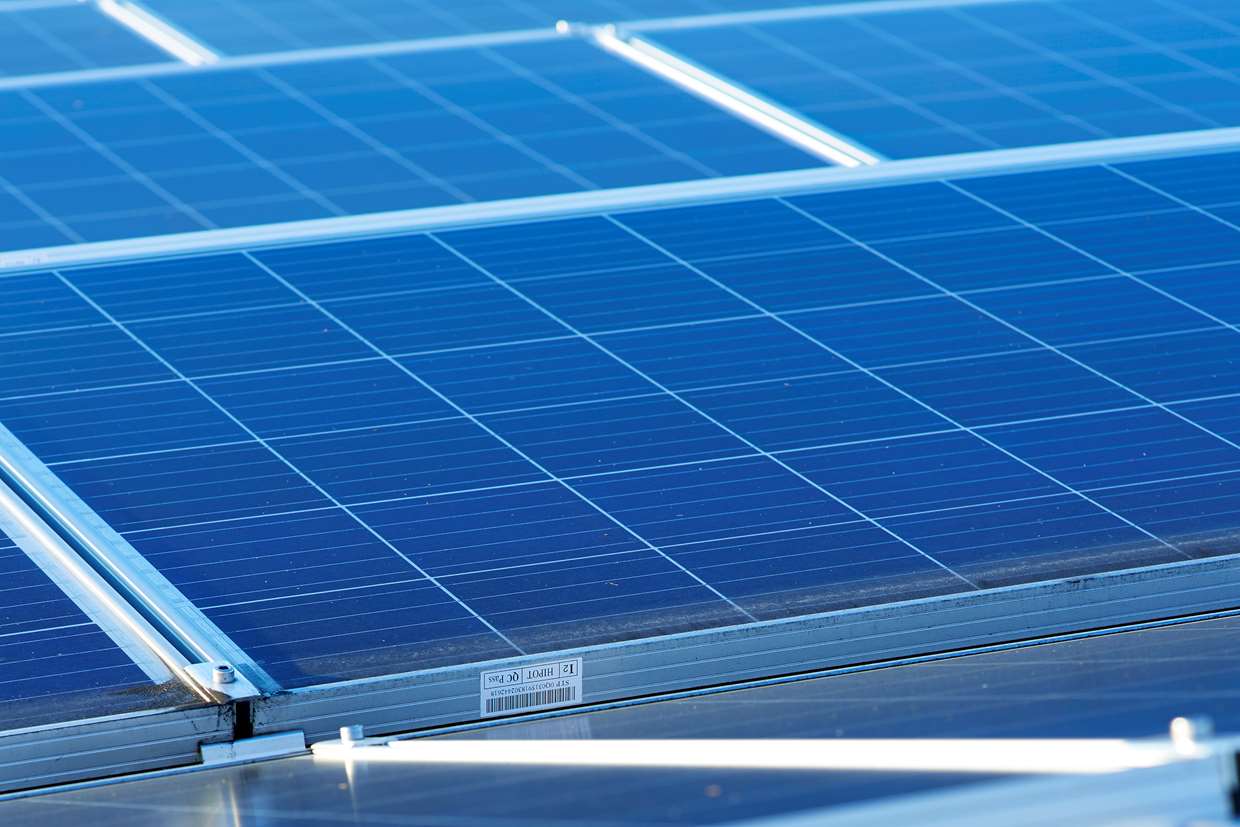Emissions and climate change
Our business activities impact the environment and the climate in various ways. We therefore endeavour to take economically appropriate measures to use resources as efficiently as possible and reduce our environmental footprint as far as possible.
Our approach to this matter
In order to provide their services, Galenica Group companies consume renewable as well as non-renewable resources. These processes generate gaseous, liquid and solid waste products as well as greenhouse gases.
Binding agreement with FOEN on targets
To reduce the carbon footprint and increase energy efficiency, binding targets have been agreed with the Federal Office for the Environment (FOEN) for the Alloga site in Burgdorf and the Galexis sites in Lausanne-Ecublens and Niederbipp as well as the Bichsel Group. In return for this commitment and if the agreed targets are met, an application can be submitted for a refund of the CO2 levy on fossil fuels or a subsidy for implementing the related measures. The targets are agreed individually based on each site’s potential. With the Energy Agency for Industry (EnAW), Galenica defines an efficiency path with various commercially viable measures.
Lowering fuel consumption
The pre-wholesale and wholesale companies regularly review and implement measures for boosting energy efficiency in order to lower fuel consumption. Mandatory driver safety training is regularly organised for Galexis, UFD, Pharmapool and Alloga drivers aiming, among other things, to ensure drivers have an environmentally friendly, fuel-efficient driving style. All Alloga, Bichsel, Galexis, Pharmapool and UFD vehicles comply with Euro emission standards. When purchasing new vehicles, only those with the latest emission control technologies are considered. In addition, externally contracted drivers are required to use only vehicles that meet at least the Euro 5 standard.
Environmental Code of Conduct
The Environmental Code of Conduct applies to all employees of the Galenica Group and provides guidance on energy saving and the protection of natural resources in the workplace and during transport.
Facts and figures
Growth-driven increase in energy consumption
The Galenica Group’s total energy consumption came to 60,132 MWh in 2020. The increase of 16% over the previous year is due to the broader reporting scope. In 2020, the environmental data for the Bichsel Group was included for the first time. Adjusted for the figures reported by the Bichsel Group, energy consumption would have been 1% lower than in the previous year. Energy consumption (in MWh) per full-time equivalent and energy consumption per CHF 1 million value added (EBITDA + personnel costs) rose by 14% and 12%, respectively. Adjusted for the Bichsel Group, however, it fell by 3% and 5%, respectively. Absolute energy consumption at the Galenica Group has risen by 33% since 2015 as a result of growth.
Electricity and fuels the most important sources of energy
Electricity and fuels are the most important sources of energy for Galenica. Electricity accounts for 45% of total energy consumption. In 2020, total electricity consumption came to 26,905 MWh. With the exception of the pharmacies, all locations use solely electricity from hydropower and photovoltaics.
44% of the energy consumed in 2020 came from fuels that were primarily utilised in the former Services Business sector and the Bichsel Group for their own fleets or by contracted drivers. Consumption by the Group’s own fleet rose by 29% in 2020. 27% of this increase is attributable to the first-time inclusion of the Bichsel Group’s fleet in 2020. The fuel consumption of third-party vehicles increased by 9% over 2019.
Galenica covers approximately 12% of its energy needs with fossil fuels, i.e. heating oil and natural gas. The absolute consumption of heating oil rose from 258 MWh in the previous year to 948 MWh, while consumption of natural gas increased from 3,809 MWh to 6,062 MWh. Adjusted for the Bichsel Group, the consumption of heating oil and natural gas would have declined by 19% and 36%, respectively.
Energy consumption 2016–2020
Mwh
Energy mix 2016–2020
in %
The Bichsel Group has been included in the figures for energy consumption since 2020.
Slightly higher CO2 emissions
CO2 emissions from the use of energy are calculated using scientifically based emission parameters (Swiss greenhouse gas inventory of the Federal Office for the Environment). In 2020, the Galenica Group’s CO2 emissions amounted to 10,576 tonnes CO2 equivalents (tCO2e), a 16% increase over the prior year. Adjusted for the Bichsel Group, CO2 emissions would have been flat. Emissions per full-time equivalent and per CHF 1 million value added (EBITDA + personnel costs) rose by 14% and 11%, respectively, compared with 2019. Emissions have risen by 35% since 2015 due to the Galenica Group’s growth. Transportation of goods is the main cause of direct and indirect CO2 emissions at Galenica (including contracted drivers). 7,020 tCO2e were released as a result in 2020, equivalent to around 66% of Galenica’s total CO2 emissions. The 16% increase in emissions from diesel compared with the previous year is primarily due to the inclusion of the Bichsel Group’s own fleet.
CO2 emissions based on scopes 2016–2020
tCO2e
Scope 1 and Scope 3 include diesel CO2 emissions for Galexis, Alloga, UFD and Pharmapool (only from 2018 onwards). The Bichsel Group’s CO2 emissions are included from 2020.
Collaboration with the EnAW paying off
Under their binding target agreement with the Swiss government, the Bichsel Group and the Alloga and Galexis sites in Burgdorf, Lausanne-Ecublens and Niederbipp are continuously striving to improve their energy efficiency. At the Niederbipp site, a groundwater heat pump went into operation and energy-saving LED lighting was installed in 2020. The measures implemented at the Bichsel Group in 2020 and at the Niederbipp and Lausanne-Ecublens sites jointly resulted in a potential reduction in annual energy consumption of more than 514 MWh and roughly 74 tons of CO2.
Potential savings, particularly in electricity consumption
The former Retail Business sector, which leases nearly all of its premises, has very limited influence on the choice of energy source for heating and electricity. However, electricity consumption can be influenced, which is why Galenica is focusing on consistently installing energy-saving lighting and motion sensors when refurbishing pharmacies. In addition, the pharmacies are seeking to raise employee awareness of specifically selected sustainability issues by means of flyers. In 2020, Galenica completed renovation measures at around 7% of the Sun Store and Amavita pharmacies in order to improve energy efficiency. This is equivalent to 20 pharmacies that were refurbished. Around 80% of all pharmacies have now been renovated.
CDP assessment stable
Galenica completed the CDP questionnaire again in 2020. CDP is an international, non-profit organisation providing the largest and sole global environmental database for companies and cities. The aim of CDP is to encourage as many companies as possible to publish data on their impact on the environment and natural resources. This information is collected in the name of 590 institutional investors, together representing more than USD 110 trillion in assets. In 2020, as in the previous year, Galenica ranked C in its level of engagement score. This certifies that the Galenica Group understands how environmental issues affect the business model. The results are published at www.cdp.net. The next questionnaire will be submitted in mid-2021 and is expected to be published in autumn 2021.
Work on renovating the Lausanne-Ecublens site commenced
In 2020, work commenced on renovating Galexis’ site in Lausanne-Ecublens. In the first phase, the exterior of the administration building is being renovated. These activities form part of the targets agreed with FOEN and entail the renovation of all buildings and roofs in order to improve energy efficiency. The Bichsel Group also started work on renovating its production hall in the year under review. The company is investing in state-of-the-art and energy-efficient installations and clean rooms and replacing the existing lighting with LED systems.
Preliminary steps towards the use of renewable energy in distribution
Transportation of goods is the main cause of direct and indirect CO2 emissions at Galenica. Against this backdrop, Galenica included in its distribution strategy a declaration of intent to make greater use of renewable energy in its distribution activities in 2020. In the year under review, Galexis ordered a new biogas-fuelled vehicle, which will be going into operation at the beginning of 2021. In addition, Galexis completed preliminary test drives of an electric vehicle for the local distribution of goods and products in the city of Zurich. The long charging times mean that electric vehicles achieve only 50% capacity utilisation at the moment and are therefore not yet economically viable. However, Galexis will continue to observe developments in the area of electromobility. Galenica sees great potential in hydrogen technology for trucks. Specific steps in this regard are to be defined in 2021.
Outlook for 2021
Galenica intends to define specific steps towards the adoption of hydrogen technology in its distribution activities. In addition, further pilot projects involving the use of electric delivery vehicles are being prepared. Under the target agreements with FOEN, Alloga will be placing the ground water heat pump in operation at the end of 2021. In addition, Galexis is planning to install a photovoltaic system at its site in Lausanne-Ecublens. In connection with the renovation of its production facilities, Bichsel is placing a new bottling line in operation in 2021. This new installation will be able to fill infusion and rinsing solutions more efficiently and with lower energy requirements.

